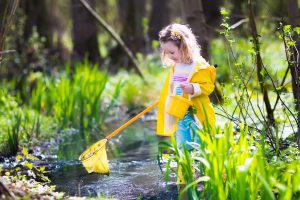
Out and about with Clifford House
There are plenty of beautiful nature spots to be found across the West Midlands, and with such a scorching summer ahead, it would be a shame for your family to spend these gorgeous days indoors!
We’ve recently had an amazing fun day at Perrymill farm with our foster families, where we discovered just how much fun the outdoors can hold and how beneficial it can be to take some time to reconnect with nature among family and friends.
Let’s explore 5 benefits of spending time out and about in nature as a family, as well as 5 free or low-cost crafts and activities you can take part in with your foster children this summer.
5 benefits of spending time in nature
- Reduce screen time
In today’s day and age, screen time is a real concern for many parents. Often it can be a challenge to get kids away from their games consoles, but taking some time to unplug from the digital world and get out and about is beneficial for all of us. It can help us to connect with the people closest to us, improve our sleep and allows us to regain perspective when we’ve been swept up in the hustle and bustle of day-to-day life.
- Learn to appreciate the natural world
There’s no better way to help children learn about the value of our beautiful planet than by experiencing it first-hand. Spending time in nature is a fantastic opportunity to teach children about the animals and plants we share our home with, as well as teaching them about climate change and how we can all take steps to protect the planet. Going on a family litter-picking walk is a great way to appreciate our beautiful home while also doing it some good!
- Get your daily dose of vitamin D
Vitamin D is vital for healthy muscles, bones and teeth. During the summer months, most of us are able to get our daily dose of this vitamin simply by spending a little bit of time out in the splendid sunshine, as sun rays react with a form of cholesterol housed in our skin to create this precious vitamin. Just remember to keep applying sunscreen throughout the day to ensure your family is safe and protected from harmful UV rays.
- Clear your mind
There is a holistic range of therapeutic benefits linked with spending time in nature, including stress reduction, improved cognition, boosting our creativity and improving our overall mood. Something as simple as taking five minutes in the morning to sit in the sun with a cup of tea, getting our hands in some soil while gardening or the Japanese practice of ‘forest bathing’ can all boost our mood and lighten our daily load.
- Enjoy quality time as a family while getting exercise
Most of us need to move our bodies more, with only 42.0% of kids in the West Midlands reporting that they were getting physically active during the time of the Covid pandemic, and numbers still not having recovered to pre-pandemic levels. Outdoor activities like walks, bike rides and having a kick-about in the park provide lots of opportunities to get fitter as a family while enjoying each other’s company.
Looking for the perfect spot to spend the summer with the family? Check out our guides to the best local walks and the best parks in the West Midlands.
5 fun nature-based crafts and activities for your foster children this summer
- Make a bee revival kit
Bees are known for being hard workers, and often times they work themselves to exhaustion. If you spot a bee in need of help lying on the pavement, try to safely move the bee onto a flower using a leaf so that it can feed and regain some energy. If there are no flowers around, making a bee revival kit is a great way to teach your kids about the importance of pollinators while becoming a helping hand to insects in need.
To make your revival kit you’ll need a small, refillable container which won’t leak. Simply mix equal parts water and white granulated sugar and fill the container. Bring your revival kit along with you on walks, or attach it to a keyring to ensure you’re always able to help any bees which may be in crisis. You can offer your homemade solution to a bee by simply placing a droplet near them— just be careful not to get them sticky!
- Try pond-dipping
Pond-dipping is an educational activity which is great for little ones. It involves scooping pond water into a tray to get a better look at the minibeasts and aquatic plant life which live there. You should be careful not to cause too much disturbance to the pond while partaking in this activity, and should always return the water and its creatures to their home when you’re done. It can be a great idea to bring along a spotting guide so you can identify the different animals you’ll come across; a great guide along with instructions on how to pond dip safely and successfully can be found here at the RSPB website.

Be sure to stay aware of your surroundings and teach your little ones about staying safe around water when venturing near ponds, lakes and rivers. If you happen to be going to the beach on holiday this year, you could try exploring a rock pool instead!
- Make nature wands
Nature wands are a simple, fun way to keep little ones entertained while out on a family walk. They’re super easy to make— simply take two sticks, tape them together at a 45° angle, then wrap the length of your makeshift ‘wand’ in sticky tape, with the sticky side facing outwards. Give the wand to your little one while out on a walk, encouraging them to decorate it with leaves, petals and sticks to create an adorable art piece.
This Instagram post from user offgridmommy shows a perfect example of what your nature wand might look like. Be sure to wash your hands after all the fun!
- Cook up something delicious using locally foraged ingredients
Visiting your community garden or foraging in your local woodlands is a fun way to gain more appreciation for our natural world while teaching your foster children the life skill of cooking. You should always stick to safe, easily-identifiable foods like blackberries, dandelions and wild garlic, which is easily identifiable by its strong scent and edible star-like flowers.
Remember the biggest rule of foraging: always take the lead when foraging with children, and even if you’re a little unsure about an item, don’t eat it! Check out this guide from the food standards agency on how to forage safely. Once you’ve picked your fresh ingredients, you can make a dinner together using the natural world such as a delicious blackberry pie, dandelion honey to spread on your toast or a fresh garlic flower salad!
- Make seed bombs
Seed bombs are an at-home craft activity which you can use to add more colour and life to your garden to create a vibrant environment perfect for pollinators. Seed bombs are exactly what they sound like— little balls filled with seeds which you can throw into bare corners of your garden. When the flowers bloom, they’ll attract more bees and butterflies! With a few simple ingredients, including wildflower seeds, water and paper, you can easily get started. Be sure to use local wildflower seeds; common UK wildflowers include cowslip, daisies and bluebells.
Looking for a tutorial on how to make the most adorable seed bombs? This recipe from Baker Ross crafts gives an excellent example of how to make vibrant, flower-shaped seed bombs.
Interested in learning more about Clifford House?
We’re a small, Outstanding-rated local fostering agency backed up by the support of Polaris community, one of the largest providers of children’s services in the UK.
If you’re interested in fostering with a friendly team who’ll take the time to really get to know your family and your needs, contact us today, or hear more from our current foster parents on why they chose Clifford House.
